Leadership and Management: A Guide to Effective Practices
VerifiedAdded on 2023/01/18
|15
|3710
|36
Report
AI Summary
This report delves into the core concepts of leadership and management, examining the qualities of a successful leader, the development of leadership skills, and the distinctions between leadership and management. It explores various leadership styles, including transformational and servant leadership, and analyzes the skills required for effective leadership, such as technical, human, and conceptual skills. The report also uses Richard Branson as an example, examining his leadership traits based on the OCEAN model, as well as Katz's three-skills approach. Furthermore, it discusses how good leadership can be developed through continuous learning, effective communication, and adapting to different situations. The report also covers the different levels of management and the processes involved. Overall, the report provides a comprehensive overview of leadership and management principles, offering insights for aspiring leaders to enhance their skills and achieve organizational goals. This assignment is contributed by a student to be published on the website Desklib. Desklib is a platform which provides all the necessary AI based study tools for students.
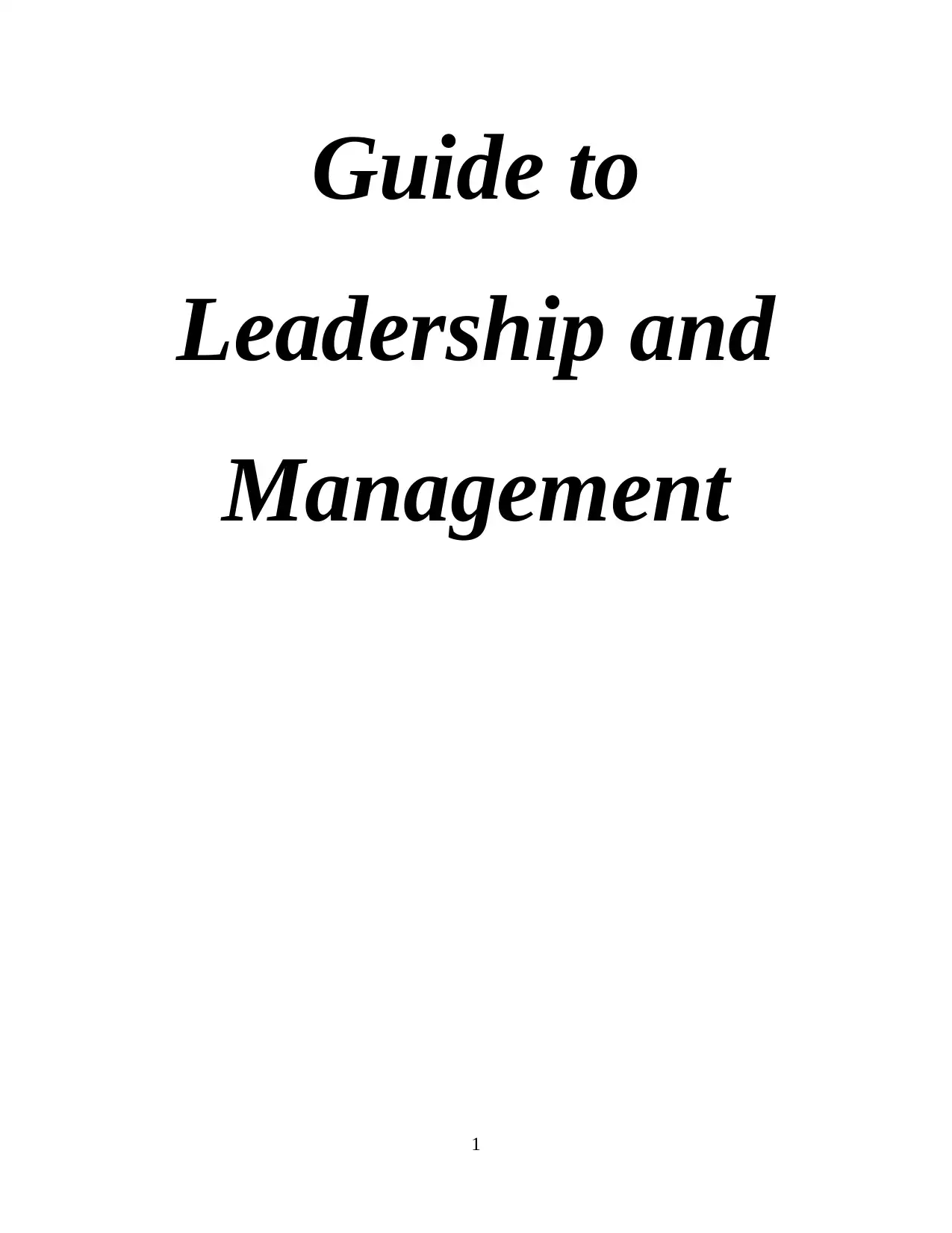
Guide to
Leadership and
Management
1
Leadership and
Management
1
Paraphrase This Document
Need a fresh take? Get an instant paraphrase of this document with our AI Paraphraser
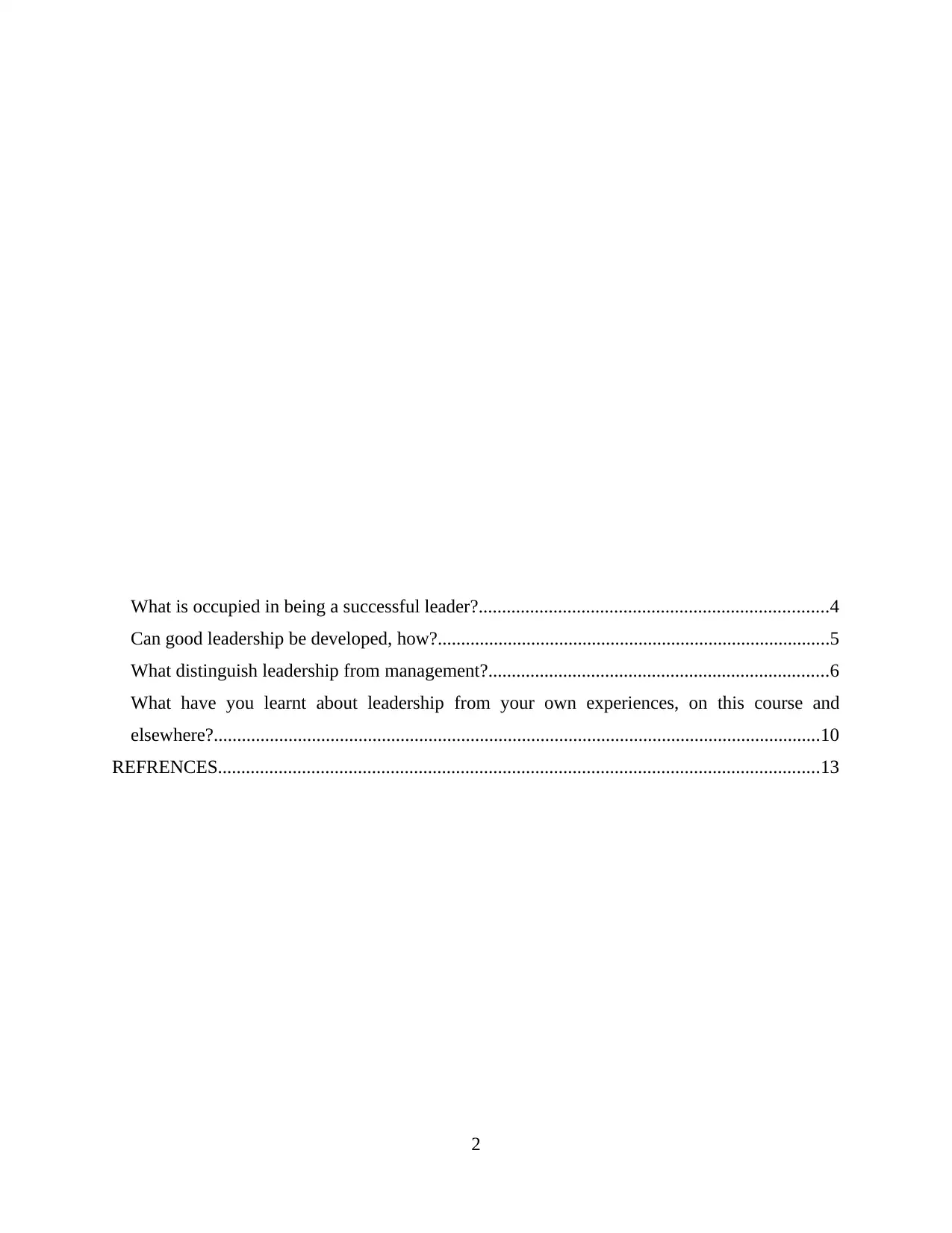
What is occupied in being a successful leader?...........................................................................4
Can good leadership be developed, how?....................................................................................5
What distinguish leadership from management?.........................................................................6
What have you learnt about leadership from your own experiences, on this course and
elsewhere?..................................................................................................................................10
REFRENCES.................................................................................................................................13
2
Can good leadership be developed, how?....................................................................................5
What distinguish leadership from management?.........................................................................6
What have you learnt about leadership from your own experiences, on this course and
elsewhere?..................................................................................................................................10
REFRENCES.................................................................................................................................13
2

3
⊘ This is a preview!⊘
Do you want full access?
Subscribe today to unlock all pages.

Trusted by 1+ million students worldwide
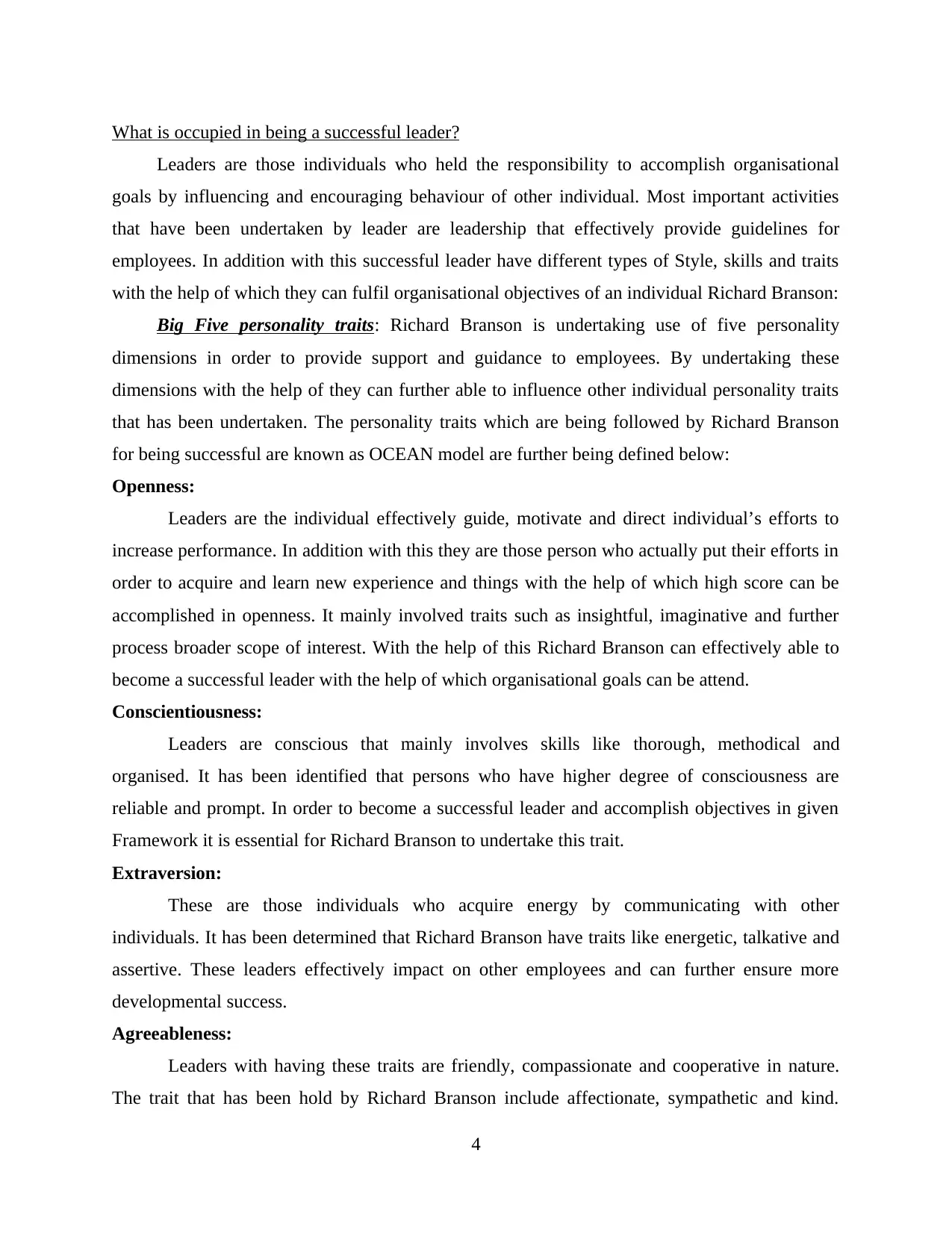
What is occupied in being a successful leader?
Leaders are those individuals who held the responsibility to accomplish organisational
goals by influencing and encouraging behaviour of other individual. Most important activities
that have been undertaken by leader are leadership that effectively provide guidelines for
employees. In addition with this successful leader have different types of Style, skills and traits
with the help of which they can fulfil organisational objectives of an individual Richard Branson:
Big Five personality traits: Richard Branson is undertaking use of five personality
dimensions in order to provide support and guidance to employees. By undertaking these
dimensions with the help of they can further able to influence other individual personality traits
that has been undertaken. The personality traits which are being followed by Richard Branson
for being successful are known as OCEAN model are further being defined below:
Openness:
Leaders are the individual effectively guide, motivate and direct individual’s efforts to
increase performance. In addition with this they are those person who actually put their efforts in
order to acquire and learn new experience and things with the help of which high score can be
accomplished in openness. It mainly involved traits such as insightful, imaginative and further
process broader scope of interest. With the help of this Richard Branson can effectively able to
become a successful leader with the help of which organisational goals can be attend.
Conscientiousness:
Leaders are conscious that mainly involves skills like thorough, methodical and
organised. It has been identified that persons who have higher degree of consciousness are
reliable and prompt. In order to become a successful leader and accomplish objectives in given
Framework it is essential for Richard Branson to undertake this trait.
Extraversion:
These are those individuals who acquire energy by communicating with other
individuals. It has been determined that Richard Branson have traits like energetic, talkative and
assertive. These leaders effectively impact on other employees and can further ensure more
developmental success.
Agreeableness:
Leaders with having these traits are friendly, compassionate and cooperative in nature.
The trait that has been hold by Richard Branson include affectionate, sympathetic and kind.
4
Leaders are those individuals who held the responsibility to accomplish organisational
goals by influencing and encouraging behaviour of other individual. Most important activities
that have been undertaken by leader are leadership that effectively provide guidelines for
employees. In addition with this successful leader have different types of Style, skills and traits
with the help of which they can fulfil organisational objectives of an individual Richard Branson:
Big Five personality traits: Richard Branson is undertaking use of five personality
dimensions in order to provide support and guidance to employees. By undertaking these
dimensions with the help of they can further able to influence other individual personality traits
that has been undertaken. The personality traits which are being followed by Richard Branson
for being successful are known as OCEAN model are further being defined below:
Openness:
Leaders are the individual effectively guide, motivate and direct individual’s efforts to
increase performance. In addition with this they are those person who actually put their efforts in
order to acquire and learn new experience and things with the help of which high score can be
accomplished in openness. It mainly involved traits such as insightful, imaginative and further
process broader scope of interest. With the help of this Richard Branson can effectively able to
become a successful leader with the help of which organisational goals can be attend.
Conscientiousness:
Leaders are conscious that mainly involves skills like thorough, methodical and
organised. It has been identified that persons who have higher degree of consciousness are
reliable and prompt. In order to become a successful leader and accomplish objectives in given
Framework it is essential for Richard Branson to undertake this trait.
Extraversion:
These are those individuals who acquire energy by communicating with other
individuals. It has been determined that Richard Branson have traits like energetic, talkative and
assertive. These leaders effectively impact on other employees and can further ensure more
developmental success.
Agreeableness:
Leaders with having these traits are friendly, compassionate and cooperative in nature.
The trait that has been hold by Richard Branson include affectionate, sympathetic and kind.
4
Paraphrase This Document
Need a fresh take? Get an instant paraphrase of this document with our AI Paraphraser
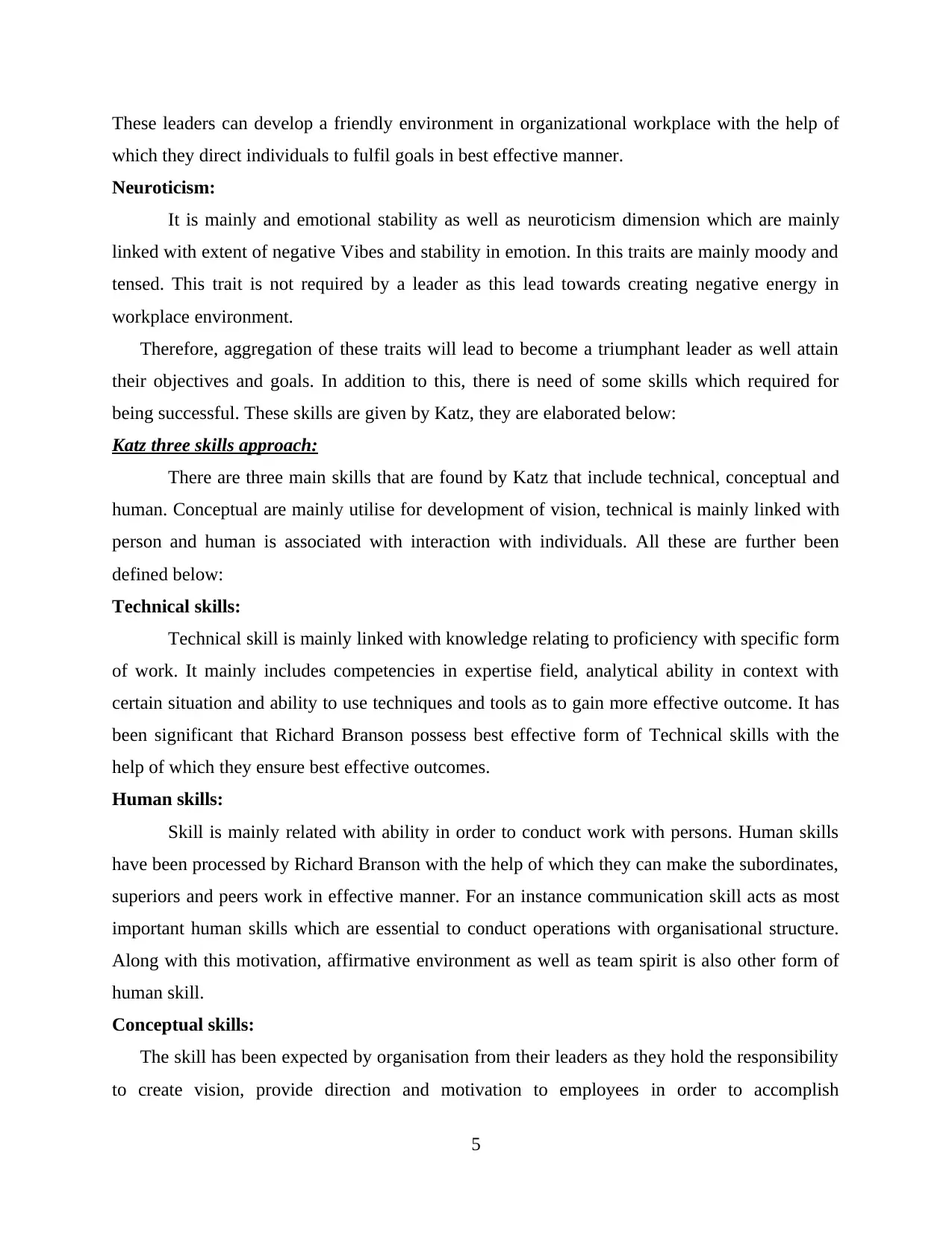
These leaders can develop a friendly environment in organizational workplace with the help of
which they direct individuals to fulfil goals in best effective manner.
Neuroticism:
It is mainly and emotional stability as well as neuroticism dimension which are mainly
linked with extent of negative Vibes and stability in emotion. In this traits are mainly moody and
tensed. This trait is not required by a leader as this lead towards creating negative energy in
workplace environment.
Therefore, aggregation of these traits will lead to become a triumphant leader as well attain
their objectives and goals. In addition to this, there is need of some skills which required for
being successful. These skills are given by Katz, they are elaborated below:
Katz three skills approach:
There are three main skills that are found by Katz that include technical, conceptual and
human. Conceptual are mainly utilise for development of vision, technical is mainly linked with
person and human is associated with interaction with individuals. All these are further been
defined below:
Technical skills:
Technical skill is mainly linked with knowledge relating to proficiency with specific form
of work. It mainly includes competencies in expertise field, analytical ability in context with
certain situation and ability to use techniques and tools as to gain more effective outcome. It has
been significant that Richard Branson possess best effective form of Technical skills with the
help of which they ensure best effective outcomes.
Human skills:
Skill is mainly related with ability in order to conduct work with persons. Human skills
have been processed by Richard Branson with the help of which they can make the subordinates,
superiors and peers work in effective manner. For an instance communication skill acts as most
important human skills which are essential to conduct operations with organisational structure.
Along with this motivation, affirmative environment as well as team spirit is also other form of
human skill.
Conceptual skills:
The skill has been expected by organisation from their leaders as they hold the responsibility
to create vision, provide direction and motivation to employees in order to accomplish
5
which they direct individuals to fulfil goals in best effective manner.
Neuroticism:
It is mainly and emotional stability as well as neuroticism dimension which are mainly
linked with extent of negative Vibes and stability in emotion. In this traits are mainly moody and
tensed. This trait is not required by a leader as this lead towards creating negative energy in
workplace environment.
Therefore, aggregation of these traits will lead to become a triumphant leader as well attain
their objectives and goals. In addition to this, there is need of some skills which required for
being successful. These skills are given by Katz, they are elaborated below:
Katz three skills approach:
There are three main skills that are found by Katz that include technical, conceptual and
human. Conceptual are mainly utilise for development of vision, technical is mainly linked with
person and human is associated with interaction with individuals. All these are further been
defined below:
Technical skills:
Technical skill is mainly linked with knowledge relating to proficiency with specific form
of work. It mainly includes competencies in expertise field, analytical ability in context with
certain situation and ability to use techniques and tools as to gain more effective outcome. It has
been significant that Richard Branson possess best effective form of Technical skills with the
help of which they ensure best effective outcomes.
Human skills:
Skill is mainly related with ability in order to conduct work with persons. Human skills
have been processed by Richard Branson with the help of which they can make the subordinates,
superiors and peers work in effective manner. For an instance communication skill acts as most
important human skills which are essential to conduct operations with organisational structure.
Along with this motivation, affirmative environment as well as team spirit is also other form of
human skill.
Conceptual skills:
The skill has been expected by organisation from their leaders as they hold the responsibility
to create vision, provide direction and motivation to employees in order to accomplish
5
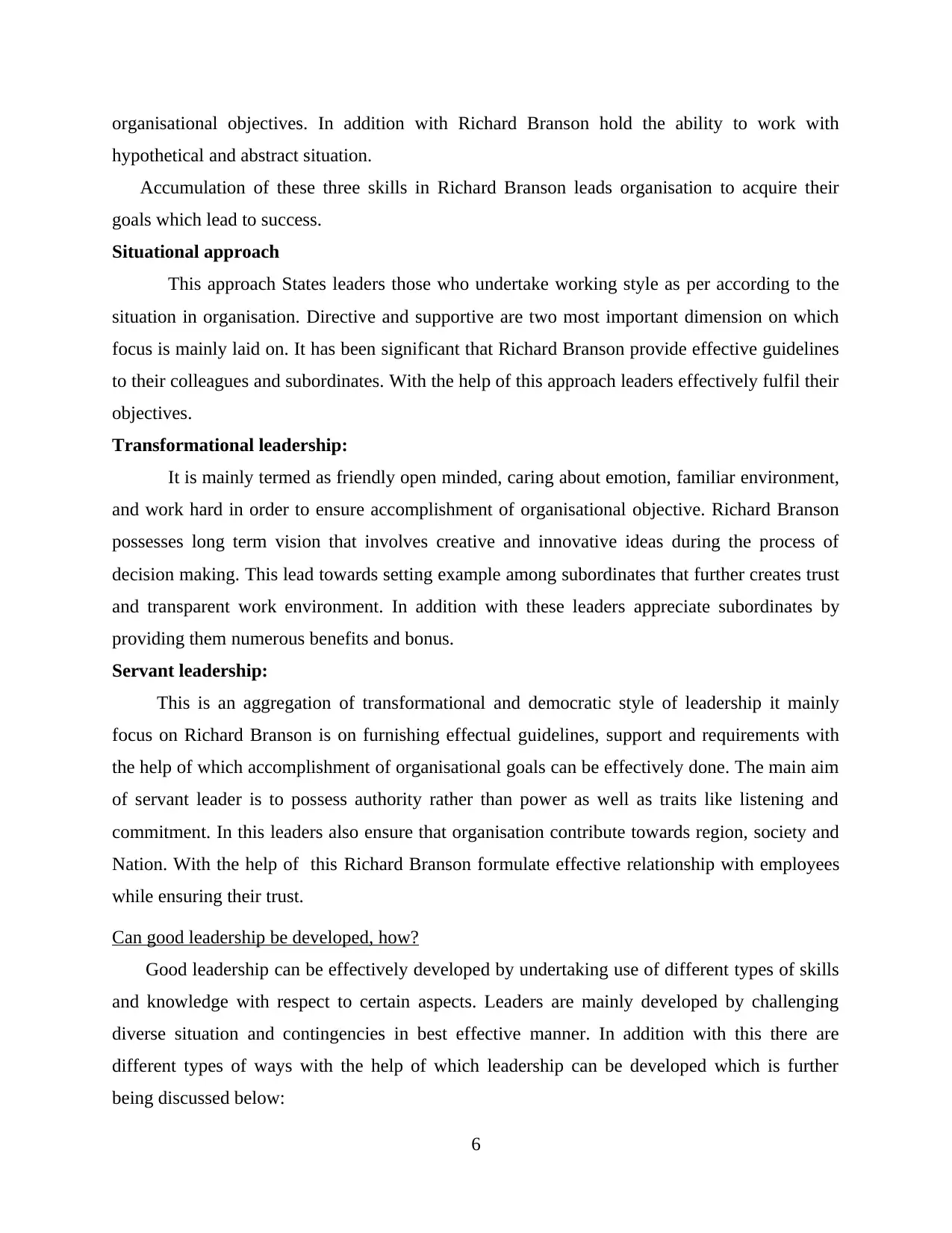
organisational objectives. In addition with Richard Branson hold the ability to work with
hypothetical and abstract situation.
Accumulation of these three skills in Richard Branson leads organisation to acquire their
goals which lead to success.
Situational approach
This approach States leaders those who undertake working style as per according to the
situation in organisation. Directive and supportive are two most important dimension on which
focus is mainly laid on. It has been significant that Richard Branson provide effective guidelines
to their colleagues and subordinates. With the help of this approach leaders effectively fulfil their
objectives.
Transformational leadership:
It is mainly termed as friendly open minded, caring about emotion, familiar environment,
and work hard in order to ensure accomplishment of organisational objective. Richard Branson
possesses long term vision that involves creative and innovative ideas during the process of
decision making. This lead towards setting example among subordinates that further creates trust
and transparent work environment. In addition with these leaders appreciate subordinates by
providing them numerous benefits and bonus.
Servant leadership:
This is an aggregation of transformational and democratic style of leadership it mainly
focus on Richard Branson is on furnishing effectual guidelines, support and requirements with
the help of which accomplishment of organisational goals can be effectively done. The main aim
of servant leader is to possess authority rather than power as well as traits like listening and
commitment. In this leaders also ensure that organisation contribute towards region, society and
Nation. With the help of this Richard Branson formulate effective relationship with employees
while ensuring their trust.
Can good leadership be developed, how?
Good leadership can be effectively developed by undertaking use of different types of skills
and knowledge with respect to certain aspects. Leaders are mainly developed by challenging
diverse situation and contingencies in best effective manner. In addition with this there are
different types of ways with the help of which leadership can be developed which is further
being discussed below:
6
hypothetical and abstract situation.
Accumulation of these three skills in Richard Branson leads organisation to acquire their
goals which lead to success.
Situational approach
This approach States leaders those who undertake working style as per according to the
situation in organisation. Directive and supportive are two most important dimension on which
focus is mainly laid on. It has been significant that Richard Branson provide effective guidelines
to their colleagues and subordinates. With the help of this approach leaders effectively fulfil their
objectives.
Transformational leadership:
It is mainly termed as friendly open minded, caring about emotion, familiar environment,
and work hard in order to ensure accomplishment of organisational objective. Richard Branson
possesses long term vision that involves creative and innovative ideas during the process of
decision making. This lead towards setting example among subordinates that further creates trust
and transparent work environment. In addition with these leaders appreciate subordinates by
providing them numerous benefits and bonus.
Servant leadership:
This is an aggregation of transformational and democratic style of leadership it mainly
focus on Richard Branson is on furnishing effectual guidelines, support and requirements with
the help of which accomplishment of organisational goals can be effectively done. The main aim
of servant leader is to possess authority rather than power as well as traits like listening and
commitment. In this leaders also ensure that organisation contribute towards region, society and
Nation. With the help of this Richard Branson formulate effective relationship with employees
while ensuring their trust.
Can good leadership be developed, how?
Good leadership can be effectively developed by undertaking use of different types of skills
and knowledge with respect to certain aspects. Leaders are mainly developed by challenging
diverse situation and contingencies in best effective manner. In addition with this there are
different types of ways with the help of which leadership can be developed which is further
being discussed below:
6
⊘ This is a preview!⊘
Do you want full access?
Subscribe today to unlock all pages.

Trusted by 1+ million students worldwide
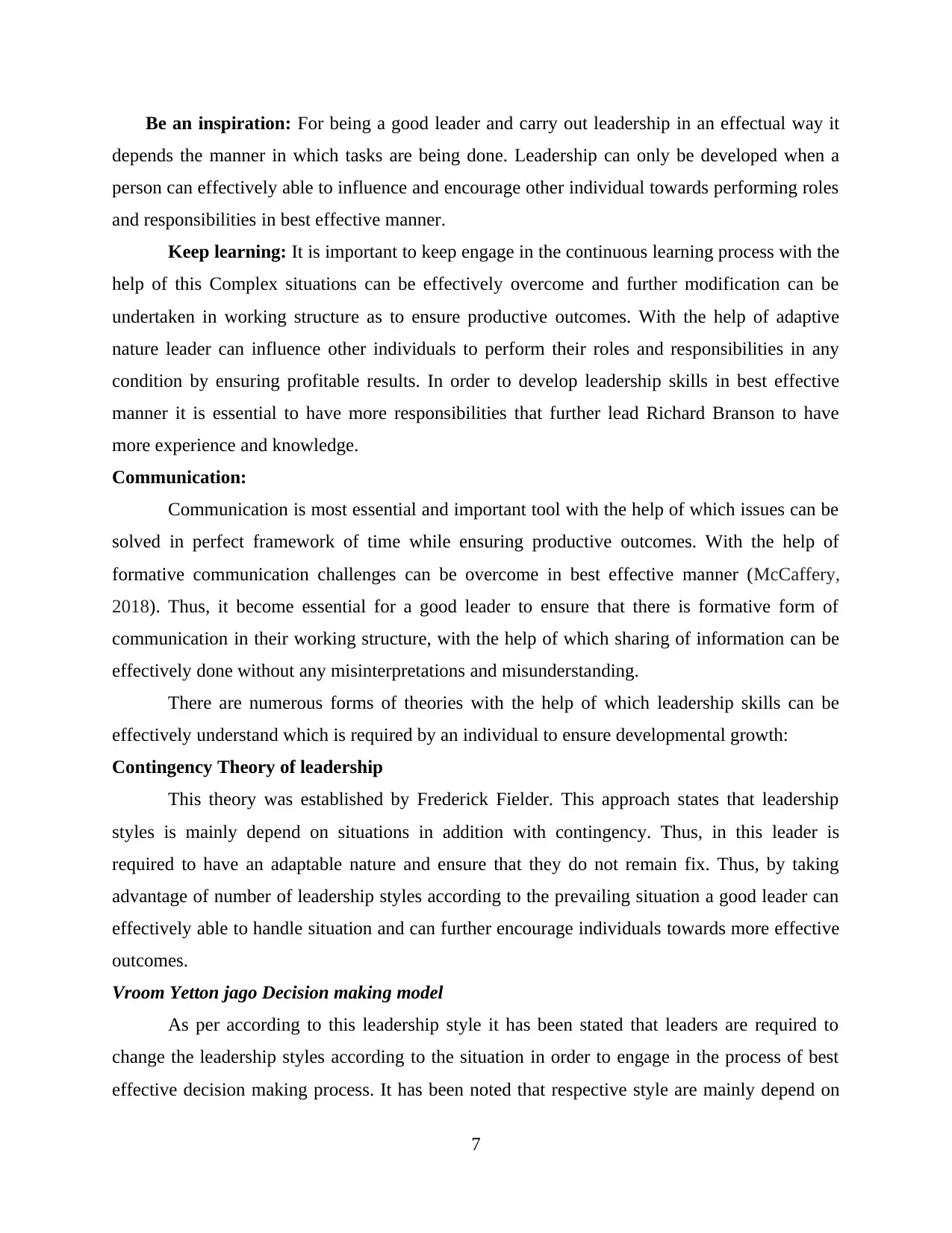
Be an inspiration: For being a good leader and carry out leadership in an effectual way it
depends the manner in which tasks are being done. Leadership can only be developed when a
person can effectively able to influence and encourage other individual towards performing roles
and responsibilities in best effective manner.
Keep learning: It is important to keep engage in the continuous learning process with the
help of this Complex situations can be effectively overcome and further modification can be
undertaken in working structure as to ensure productive outcomes. With the help of adaptive
nature leader can influence other individuals to perform their roles and responsibilities in any
condition by ensuring profitable results. In order to develop leadership skills in best effective
manner it is essential to have more responsibilities that further lead Richard Branson to have
more experience and knowledge.
Communication:
Communication is most essential and important tool with the help of which issues can be
solved in perfect framework of time while ensuring productive outcomes. With the help of
formative communication challenges can be overcome in best effective manner (McCaffery,
2018). Thus, it become essential for a good leader to ensure that there is formative form of
communication in their working structure, with the help of which sharing of information can be
effectively done without any misinterpretations and misunderstanding.
There are numerous forms of theories with the help of which leadership skills can be
effectively understand which is required by an individual to ensure developmental growth:
Contingency Theory of leadership
This theory was established by Frederick Fielder. This approach states that leadership
styles is mainly depend on situations in addition with contingency. Thus, in this leader is
required to have an adaptable nature and ensure that they do not remain fix. Thus, by taking
advantage of number of leadership styles according to the prevailing situation a good leader can
effectively able to handle situation and can further encourage individuals towards more effective
outcomes.
Vroom Yetton jago Decision making model
As per according to this leadership style it has been stated that leaders are required to
change the leadership styles according to the situation in order to engage in the process of best
effective decision making process. It has been noted that respective style are mainly depend on
7
depends the manner in which tasks are being done. Leadership can only be developed when a
person can effectively able to influence and encourage other individual towards performing roles
and responsibilities in best effective manner.
Keep learning: It is important to keep engage in the continuous learning process with the
help of this Complex situations can be effectively overcome and further modification can be
undertaken in working structure as to ensure productive outcomes. With the help of adaptive
nature leader can influence other individuals to perform their roles and responsibilities in any
condition by ensuring profitable results. In order to develop leadership skills in best effective
manner it is essential to have more responsibilities that further lead Richard Branson to have
more experience and knowledge.
Communication:
Communication is most essential and important tool with the help of which issues can be
solved in perfect framework of time while ensuring productive outcomes. With the help of
formative communication challenges can be overcome in best effective manner (McCaffery,
2018). Thus, it become essential for a good leader to ensure that there is formative form of
communication in their working structure, with the help of which sharing of information can be
effectively done without any misinterpretations and misunderstanding.
There are numerous forms of theories with the help of which leadership skills can be
effectively understand which is required by an individual to ensure developmental growth:
Contingency Theory of leadership
This theory was established by Frederick Fielder. This approach states that leadership
styles is mainly depend on situations in addition with contingency. Thus, in this leader is
required to have an adaptable nature and ensure that they do not remain fix. Thus, by taking
advantage of number of leadership styles according to the prevailing situation a good leader can
effectively able to handle situation and can further encourage individuals towards more effective
outcomes.
Vroom Yetton jago Decision making model
As per according to this leadership style it has been stated that leaders are required to
change the leadership styles according to the situation in order to engage in the process of best
effective decision making process. It has been noted that respective style are mainly depend on
7
Paraphrase This Document
Need a fresh take? Get an instant paraphrase of this document with our AI Paraphraser
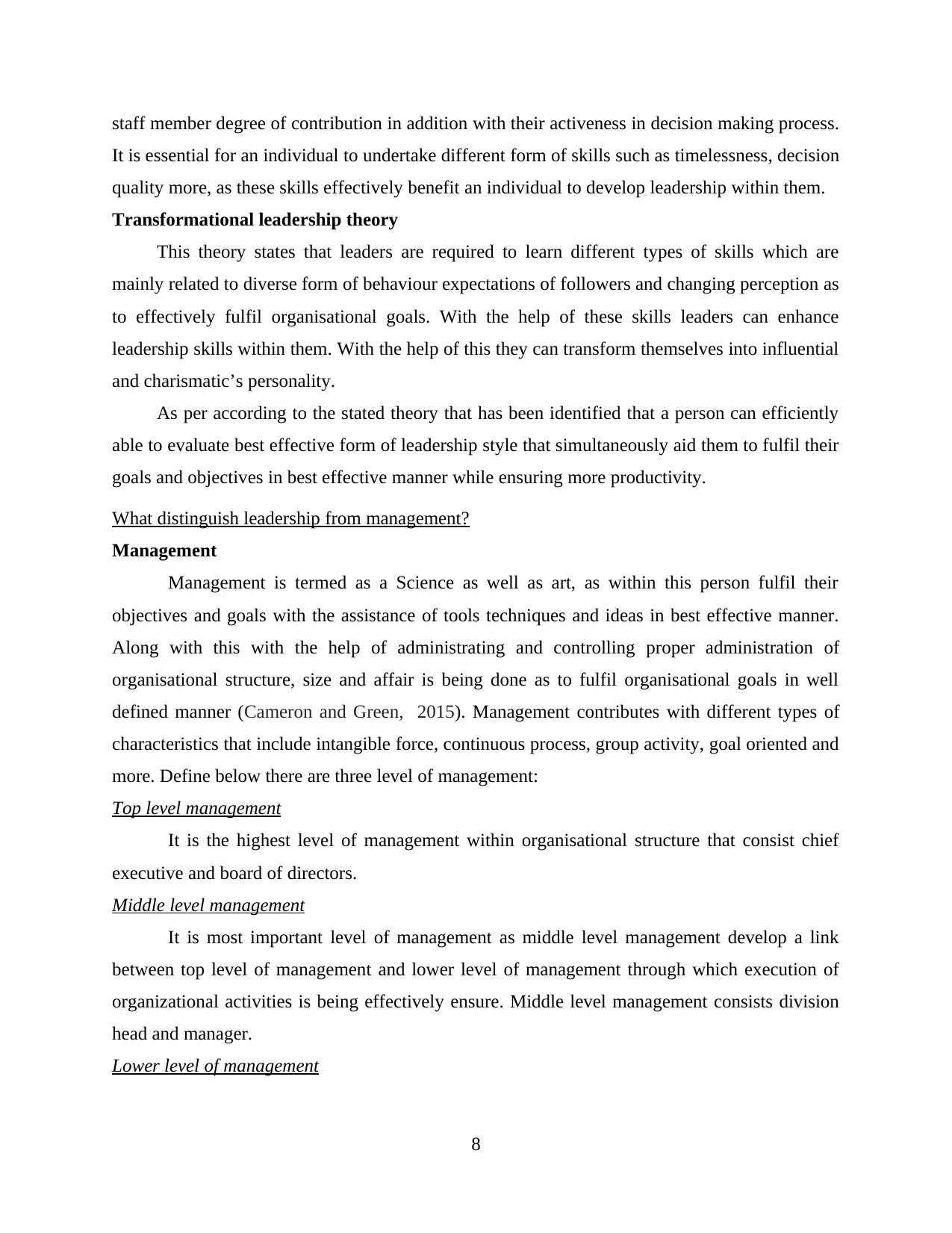
staff member degree of contribution in addition with their activeness in decision making process.
It is essential for an individual to undertake different form of skills such as timelessness, decision
quality more, as these skills effectively benefit an individual to develop leadership within them.
Transformational leadership theory
This theory states that leaders are required to learn different types of skills which are
mainly related to diverse form of behaviour expectations of followers and changing perception as
to effectively fulfil organisational goals. With the help of these skills leaders can enhance
leadership skills within them. With the help of this they can transform themselves into influential
and charismatic’s personality.
As per according to the stated theory that has been identified that a person can efficiently
able to evaluate best effective form of leadership style that simultaneously aid them to fulfil their
goals and objectives in best effective manner while ensuring more productivity.
What distinguish leadership from management?
Management
Management is termed as a Science as well as art, as within this person fulfil their
objectives and goals with the assistance of tools techniques and ideas in best effective manner.
Along with this with the help of administrating and controlling proper administration of
organisational structure, size and affair is being done as to fulfil organisational goals in well
defined manner (Cameron and Green, 2015). Management contributes with different types of
characteristics that include intangible force, continuous process, group activity, goal oriented and
more. Define below there are three level of management:
Top level management
It is the highest level of management within organisational structure that consist chief
executive and board of directors.
Middle level management
It is most important level of management as middle level management develop a link
between top level of management and lower level of management through which execution of
organizational activities is being effectively ensure. Middle level management consists division
head and manager.
Lower level of management
8
It is essential for an individual to undertake different form of skills such as timelessness, decision
quality more, as these skills effectively benefit an individual to develop leadership within them.
Transformational leadership theory
This theory states that leaders are required to learn different types of skills which are
mainly related to diverse form of behaviour expectations of followers and changing perception as
to effectively fulfil organisational goals. With the help of these skills leaders can enhance
leadership skills within them. With the help of this they can transform themselves into influential
and charismatic’s personality.
As per according to the stated theory that has been identified that a person can efficiently
able to evaluate best effective form of leadership style that simultaneously aid them to fulfil their
goals and objectives in best effective manner while ensuring more productivity.
What distinguish leadership from management?
Management
Management is termed as a Science as well as art, as within this person fulfil their
objectives and goals with the assistance of tools techniques and ideas in best effective manner.
Along with this with the help of administrating and controlling proper administration of
organisational structure, size and affair is being done as to fulfil organisational goals in well
defined manner (Cameron and Green, 2015). Management contributes with different types of
characteristics that include intangible force, continuous process, group activity, goal oriented and
more. Define below there are three level of management:
Top level management
It is the highest level of management within organisational structure that consist chief
executive and board of directors.
Middle level management
It is most important level of management as middle level management develop a link
between top level of management and lower level of management through which execution of
organizational activities is being effectively ensure. Middle level management consists division
head and manager.
Lower level of management
8
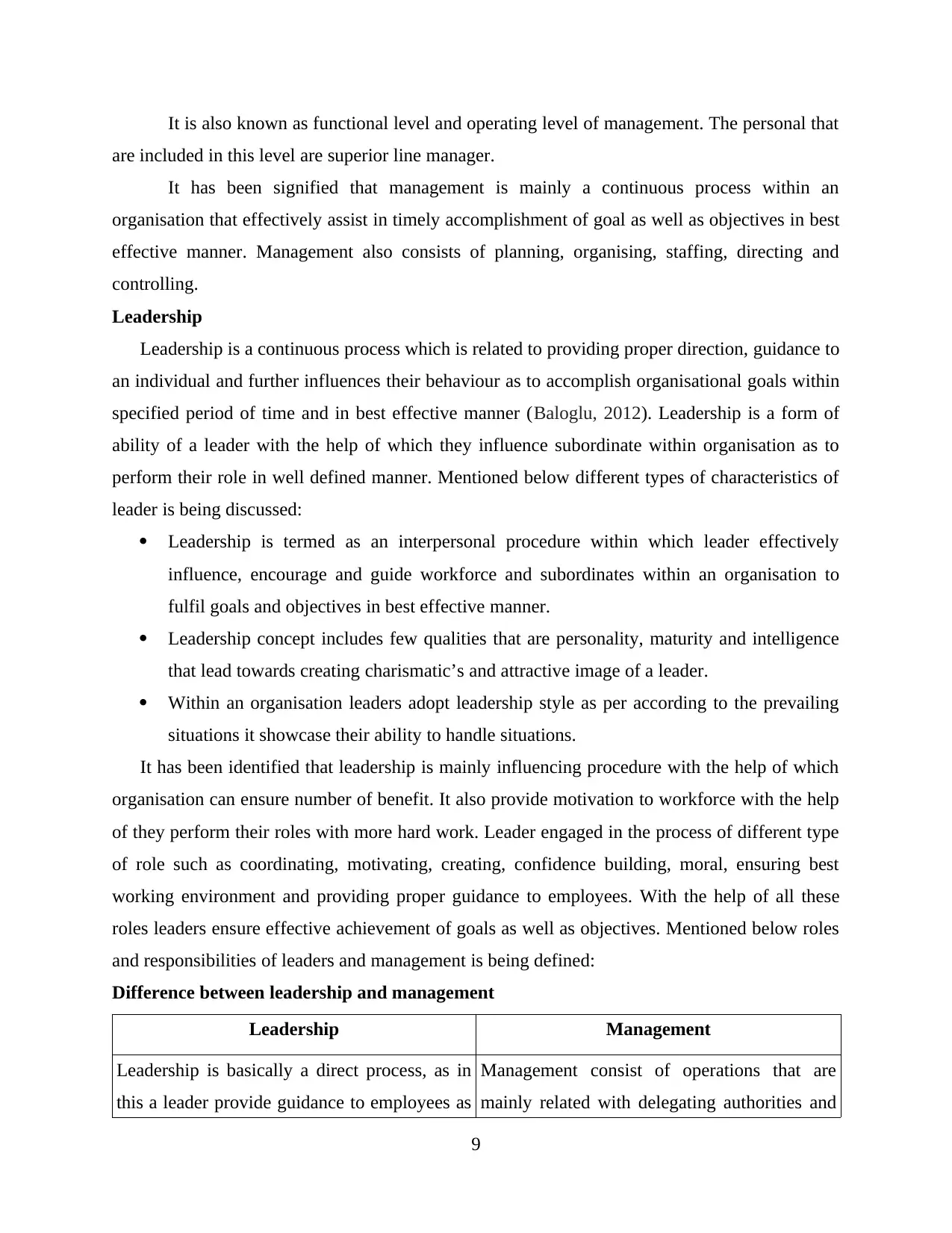
It is also known as functional level and operating level of management. The personal that
are included in this level are superior line manager.
It has been signified that management is mainly a continuous process within an
organisation that effectively assist in timely accomplishment of goal as well as objectives in best
effective manner. Management also consists of planning, organising, staffing, directing and
controlling.
Leadership
Leadership is a continuous process which is related to providing proper direction, guidance to
an individual and further influences their behaviour as to accomplish organisational goals within
specified period of time and in best effective manner (Baloglu, 2012). Leadership is a form of
ability of a leader with the help of which they influence subordinate within organisation as to
perform their role in well defined manner. Mentioned below different types of characteristics of
leader is being discussed:
Leadership is termed as an interpersonal procedure within which leader effectively
influence, encourage and guide workforce and subordinates within an organisation to
fulfil goals and objectives in best effective manner.
Leadership concept includes few qualities that are personality, maturity and intelligence
that lead towards creating charismatic’s and attractive image of a leader.
Within an organisation leaders adopt leadership style as per according to the prevailing
situations it showcase their ability to handle situations.
It has been identified that leadership is mainly influencing procedure with the help of which
organisation can ensure number of benefit. It also provide motivation to workforce with the help
of they perform their roles with more hard work. Leader engaged in the process of different type
of role such as coordinating, motivating, creating, confidence building, moral, ensuring best
working environment and providing proper guidance to employees. With the help of all these
roles leaders ensure effective achievement of goals as well as objectives. Mentioned below roles
and responsibilities of leaders and management is being defined:
Difference between leadership and management
Leadership Management
Leadership is basically a direct process, as in
this a leader provide guidance to employees as
Management consist of operations that are
mainly related with delegating authorities and
9
are included in this level are superior line manager.
It has been signified that management is mainly a continuous process within an
organisation that effectively assist in timely accomplishment of goal as well as objectives in best
effective manner. Management also consists of planning, organising, staffing, directing and
controlling.
Leadership
Leadership is a continuous process which is related to providing proper direction, guidance to
an individual and further influences their behaviour as to accomplish organisational goals within
specified period of time and in best effective manner (Baloglu, 2012). Leadership is a form of
ability of a leader with the help of which they influence subordinate within organisation as to
perform their role in well defined manner. Mentioned below different types of characteristics of
leader is being discussed:
Leadership is termed as an interpersonal procedure within which leader effectively
influence, encourage and guide workforce and subordinates within an organisation to
fulfil goals and objectives in best effective manner.
Leadership concept includes few qualities that are personality, maturity and intelligence
that lead towards creating charismatic’s and attractive image of a leader.
Within an organisation leaders adopt leadership style as per according to the prevailing
situations it showcase their ability to handle situations.
It has been identified that leadership is mainly influencing procedure with the help of which
organisation can ensure number of benefit. It also provide motivation to workforce with the help
of they perform their roles with more hard work. Leader engaged in the process of different type
of role such as coordinating, motivating, creating, confidence building, moral, ensuring best
working environment and providing proper guidance to employees. With the help of all these
roles leaders ensure effective achievement of goals as well as objectives. Mentioned below roles
and responsibilities of leaders and management is being defined:
Difference between leadership and management
Leadership Management
Leadership is basically a direct process, as in
this a leader provide guidance to employees as
Management consist of operations that are
mainly related with delegating authorities and
9
⊘ This is a preview!⊘
Do you want full access?
Subscribe today to unlock all pages.

Trusted by 1+ million students worldwide
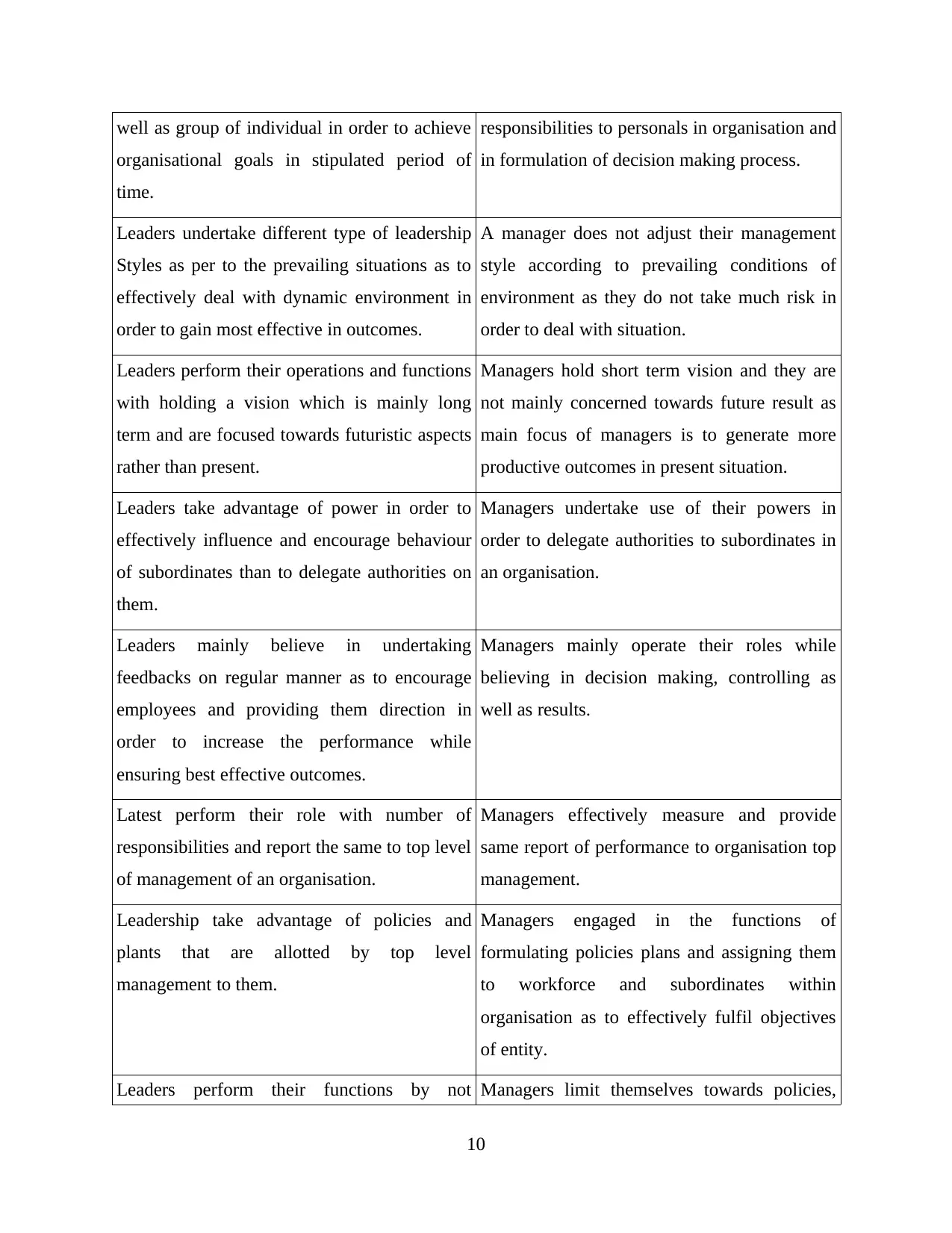
well as group of individual in order to achieve
organisational goals in stipulated period of
time.
responsibilities to personals in organisation and
in formulation of decision making process.
Leaders undertake different type of leadership
Styles as per to the prevailing situations as to
effectively deal with dynamic environment in
order to gain most effective in outcomes.
A manager does not adjust their management
style according to prevailing conditions of
environment as they do not take much risk in
order to deal with situation.
Leaders perform their operations and functions
with holding a vision which is mainly long
term and are focused towards futuristic aspects
rather than present.
Managers hold short term vision and they are
not mainly concerned towards future result as
main focus of managers is to generate more
productive outcomes in present situation.
Leaders take advantage of power in order to
effectively influence and encourage behaviour
of subordinates than to delegate authorities on
them.
Managers undertake use of their powers in
order to delegate authorities to subordinates in
an organisation.
Leaders mainly believe in undertaking
feedbacks on regular manner as to encourage
employees and providing them direction in
order to increase the performance while
ensuring best effective outcomes.
Managers mainly operate their roles while
believing in decision making, controlling as
well as results.
Latest perform their role with number of
responsibilities and report the same to top level
of management of an organisation.
Managers effectively measure and provide
same report of performance to organisation top
management.
Leadership take advantage of policies and
plants that are allotted by top level
management to them.
Managers engaged in the functions of
formulating policies plans and assigning them
to workforce and subordinates within
organisation as to effectively fulfil objectives
of entity.
Leaders perform their functions by not Managers limit themselves towards policies,
10
organisational goals in stipulated period of
time.
responsibilities to personals in organisation and
in formulation of decision making process.
Leaders undertake different type of leadership
Styles as per to the prevailing situations as to
effectively deal with dynamic environment in
order to gain most effective in outcomes.
A manager does not adjust their management
style according to prevailing conditions of
environment as they do not take much risk in
order to deal with situation.
Leaders perform their operations and functions
with holding a vision which is mainly long
term and are focused towards futuristic aspects
rather than present.
Managers hold short term vision and they are
not mainly concerned towards future result as
main focus of managers is to generate more
productive outcomes in present situation.
Leaders take advantage of power in order to
effectively influence and encourage behaviour
of subordinates than to delegate authorities on
them.
Managers undertake use of their powers in
order to delegate authorities to subordinates in
an organisation.
Leaders mainly believe in undertaking
feedbacks on regular manner as to encourage
employees and providing them direction in
order to increase the performance while
ensuring best effective outcomes.
Managers mainly operate their roles while
believing in decision making, controlling as
well as results.
Latest perform their role with number of
responsibilities and report the same to top level
of management of an organisation.
Managers effectively measure and provide
same report of performance to organisation top
management.
Leadership take advantage of policies and
plants that are allotted by top level
management to them.
Managers engaged in the functions of
formulating policies plans and assigning them
to workforce and subordinates within
organisation as to effectively fulfil objectives
of entity.
Leaders perform their functions by not Managers limit themselves towards policies,
10
Paraphrase This Document
Need a fresh take? Get an instant paraphrase of this document with our AI Paraphraser
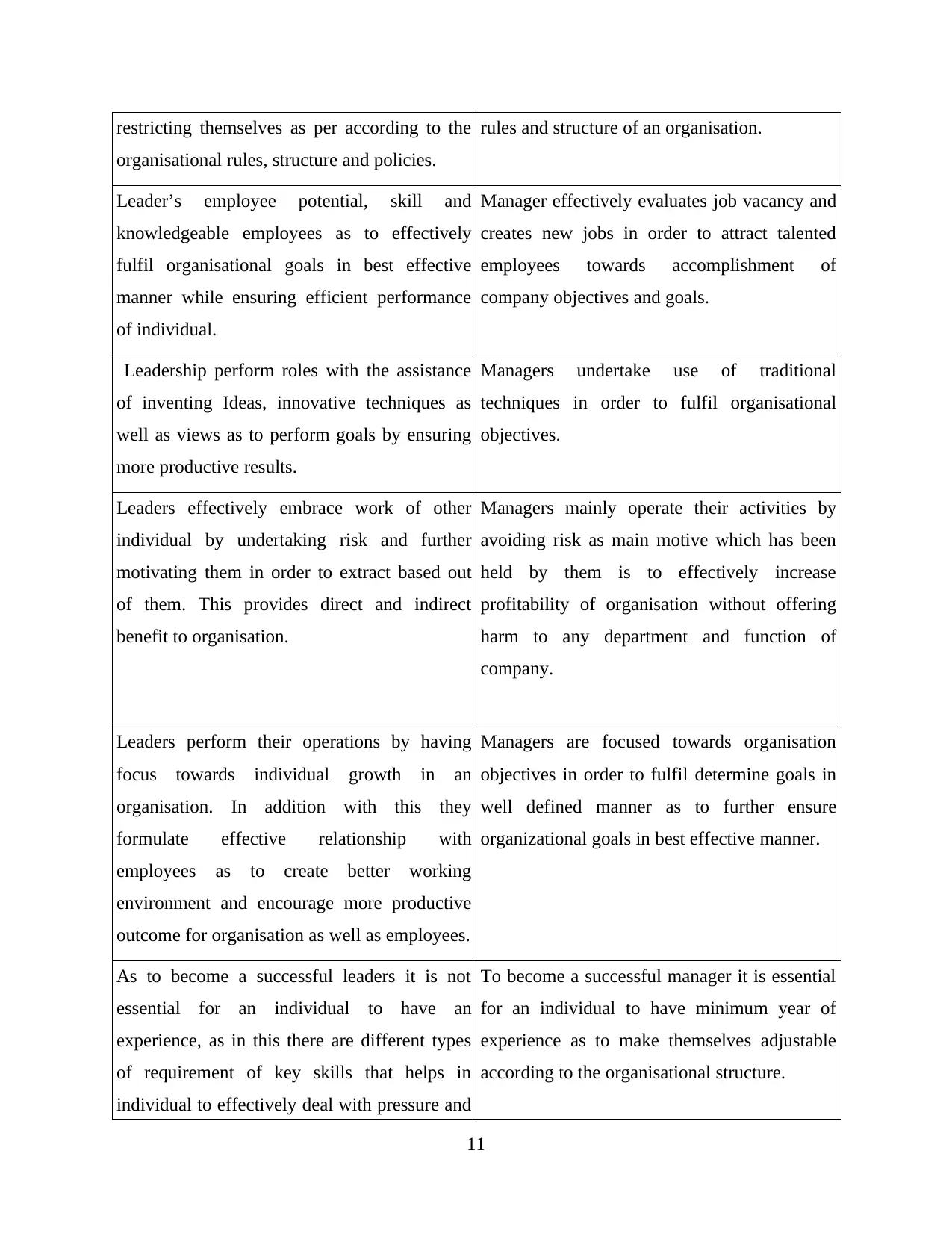
restricting themselves as per according to the
organisational rules, structure and policies.
rules and structure of an organisation.
Leader’s employee potential, skill and
knowledgeable employees as to effectively
fulfil organisational goals in best effective
manner while ensuring efficient performance
of individual.
Manager effectively evaluates job vacancy and
creates new jobs in order to attract talented
employees towards accomplishment of
company objectives and goals.
Leadership perform roles with the assistance
of inventing Ideas, innovative techniques as
well as views as to perform goals by ensuring
more productive results.
Managers undertake use of traditional
techniques in order to fulfil organisational
objectives.
Leaders effectively embrace work of other
individual by undertaking risk and further
motivating them in order to extract based out
of them. This provides direct and indirect
benefit to organisation.
Managers mainly operate their activities by
avoiding risk as main motive which has been
held by them is to effectively increase
profitability of organisation without offering
harm to any department and function of
company.
Leaders perform their operations by having
focus towards individual growth in an
organisation. In addition with this they
formulate effective relationship with
employees as to create better working
environment and encourage more productive
outcome for organisation as well as employees.
Managers are focused towards organisation
objectives in order to fulfil determine goals in
well defined manner as to further ensure
organizational goals in best effective manner.
As to become a successful leaders it is not
essential for an individual to have an
experience, as in this there are different types
of requirement of key skills that helps in
individual to effectively deal with pressure and
To become a successful manager it is essential
for an individual to have minimum year of
experience as to make themselves adjustable
according to the organisational structure.
11
organisational rules, structure and policies.
rules and structure of an organisation.
Leader’s employee potential, skill and
knowledgeable employees as to effectively
fulfil organisational goals in best effective
manner while ensuring efficient performance
of individual.
Manager effectively evaluates job vacancy and
creates new jobs in order to attract talented
employees towards accomplishment of
company objectives and goals.
Leadership perform roles with the assistance
of inventing Ideas, innovative techniques as
well as views as to perform goals by ensuring
more productive results.
Managers undertake use of traditional
techniques in order to fulfil organisational
objectives.
Leaders effectively embrace work of other
individual by undertaking risk and further
motivating them in order to extract based out
of them. This provides direct and indirect
benefit to organisation.
Managers mainly operate their activities by
avoiding risk as main motive which has been
held by them is to effectively increase
profitability of organisation without offering
harm to any department and function of
company.
Leaders perform their operations by having
focus towards individual growth in an
organisation. In addition with this they
formulate effective relationship with
employees as to create better working
environment and encourage more productive
outcome for organisation as well as employees.
Managers are focused towards organisation
objectives in order to fulfil determine goals in
well defined manner as to further ensure
organizational goals in best effective manner.
As to become a successful leaders it is not
essential for an individual to have an
experience, as in this there are different types
of requirement of key skills that helps in
individual to effectively deal with pressure and
To become a successful manager it is essential
for an individual to have minimum year of
experience as to make themselves adjustable
according to the organisational structure.
11
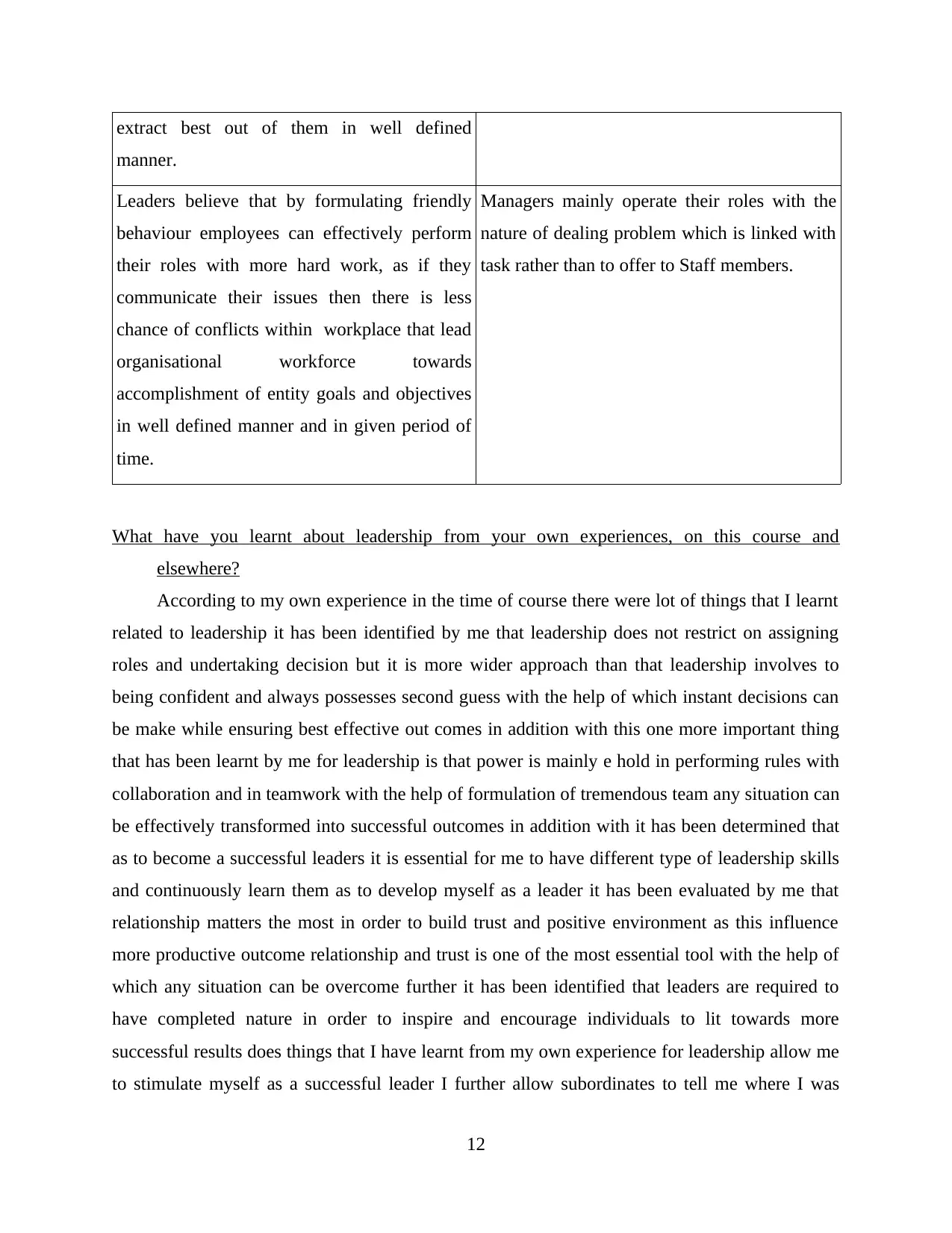
extract best out of them in well defined
manner.
Leaders believe that by formulating friendly
behaviour employees can effectively perform
their roles with more hard work, as if they
communicate their issues then there is less
chance of conflicts within workplace that lead
organisational workforce towards
accomplishment of entity goals and objectives
in well defined manner and in given period of
time.
Managers mainly operate their roles with the
nature of dealing problem which is linked with
task rather than to offer to Staff members.
What have you learnt about leadership from your own experiences, on this course and
elsewhere?
According to my own experience in the time of course there were lot of things that I learnt
related to leadership it has been identified by me that leadership does not restrict on assigning
roles and undertaking decision but it is more wider approach than that leadership involves to
being confident and always possesses second guess with the help of which instant decisions can
be make while ensuring best effective out comes in addition with this one more important thing
that has been learnt by me for leadership is that power is mainly e hold in performing rules with
collaboration and in teamwork with the help of formulation of tremendous team any situation can
be effectively transformed into successful outcomes in addition with it has been determined that
as to become a successful leaders it is essential for me to have different type of leadership skills
and continuously learn them as to develop myself as a leader it has been evaluated by me that
relationship matters the most in order to build trust and positive environment as this influence
more productive outcome relationship and trust is one of the most essential tool with the help of
which any situation can be overcome further it has been identified that leaders are required to
have completed nature in order to inspire and encourage individuals to lit towards more
successful results does things that I have learnt from my own experience for leadership allow me
to stimulate myself as a successful leader I further allow subordinates to tell me where I was
12
manner.
Leaders believe that by formulating friendly
behaviour employees can effectively perform
their roles with more hard work, as if they
communicate their issues then there is less
chance of conflicts within workplace that lead
organisational workforce towards
accomplishment of entity goals and objectives
in well defined manner and in given period of
time.
Managers mainly operate their roles with the
nature of dealing problem which is linked with
task rather than to offer to Staff members.
What have you learnt about leadership from your own experiences, on this course and
elsewhere?
According to my own experience in the time of course there were lot of things that I learnt
related to leadership it has been identified by me that leadership does not restrict on assigning
roles and undertaking decision but it is more wider approach than that leadership involves to
being confident and always possesses second guess with the help of which instant decisions can
be make while ensuring best effective out comes in addition with this one more important thing
that has been learnt by me for leadership is that power is mainly e hold in performing rules with
collaboration and in teamwork with the help of formulation of tremendous team any situation can
be effectively transformed into successful outcomes in addition with it has been determined that
as to become a successful leaders it is essential for me to have different type of leadership skills
and continuously learn them as to develop myself as a leader it has been evaluated by me that
relationship matters the most in order to build trust and positive environment as this influence
more productive outcome relationship and trust is one of the most essential tool with the help of
which any situation can be overcome further it has been identified that leaders are required to
have completed nature in order to inspire and encourage individuals to lit towards more
successful results does things that I have learnt from my own experience for leadership allow me
to stimulate myself as a successful leader I further allow subordinates to tell me where I was
12
⊘ This is a preview!⊘
Do you want full access?
Subscribe today to unlock all pages.

Trusted by 1+ million students worldwide
1 out of 15
Related Documents
Your All-in-One AI-Powered Toolkit for Academic Success.
+13062052269
info@desklib.com
Available 24*7 on WhatsApp / Email
![[object Object]](/_next/static/media/star-bottom.7253800d.svg)
Unlock your academic potential
Copyright © 2020–2025 A2Z Services. All Rights Reserved. Developed and managed by ZUCOL.



